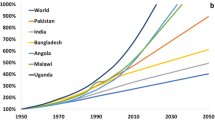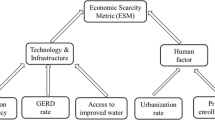Abstract
Water scarcity has been an important issue for many countries. The water scarcity is still growing in some region but may be exacerbated by recent climate change. Both international and domestic reports classified Korea into water scarcity country on the basis of Falkenmark indicator. Korea, however, missed the concept of green water in calculating their annual renewable water resources per capita and erroneously defined them as water scarcity country. A new calculation shows that Korea has no water scarcity with 1712 m3 of annual renewable water resource per capita. Wrong information in Korea was badly used for political propagation and private purpose. This may be happening to other countries. Water resources experts need to include the concept of green water in reanalyzing the annual renewable water resources to provide decision-makers with acceptable guideline. Decision should be made with more reliable ground.
Similar content being viewed by others
References
Brown, L.R., State of the World 1995, L., UK: Earthscan publication Ltd., 1995.
Brown, A. and Matlock, M.D., A Review of Water Scarcity Indices and Methodologies, White paper no. 106, The Sustainability Consortium, USA, 2011.
Falkenmark, M., Lundquist, J., and Widstrand, C., Macro-scale water scarcity requires micro-scale approaches: aspects of vulnerability in semi-arid development, Nat. Res. Forum, 1989, vol. 13, pp. 258–267.
Falkenmark, M. and Rockstrom, J., Balancing Water for Man and Nature: the New Approach to Ecohydrol., UK: EarthScan, 2004.
Falkenmark, M. and Rockstrom, J., The new blue and green water paradigm: breaking new ground for water resources planning and management, J. Wat. Res. Planning Manag.–ASCE, 2006, vol. 132, no. 3, pp. 129–132.
Gardner-Outlaw, T. and Engleman, R., Sustainable Water, Easing Scarcity: A Second Update, Population Action International, 1997.
Gassert, F., Landis, M., Luck, M., Reig, P., and Shiao, T., Aqueduct Matadata Document: Aqueduct Global Maps 2.0, Washington DC, USA: World Resources Institute, 2013.
Gleick, P., The World’s Water: The Biennial Report on Freshwater Resources 2002–2003, Washington, DC: Island Press, 2002.
Postel, S.L., Daily, G.C., and Ehrlich, P.R., Human appropriation of renewable fresh water, Sci., 1996, vol. 271, pp. 785–788.
Savenije, H.H.G., Water scarcity indicators; the deception of the numbers, Phys. Chem. Earth, Ser. B, 2000, vol. 25, no. 3, pp. 199–204.
The ministry of Land, Infrastructure, and Transport, in National Water Resources Plan, MOLTI, S. Korea, 2006 (in Korean).
UNEP, Briefing Water Scarcity, Institute European Environmental Policy, 2011.
Yang, H., Reichert, P., Abbaspour, K.C., and Zehnder, A.J.B., A water resources threshold and its implications for food security, Environ. Sci., 2003, vol. 37, no. 14, pp. 3048–3054.
Author information
Authors and Affiliations
Corresponding author
Additional information
The article is published in the original.
Rights and permissions
About this article
Cite this article
Lee, KH. Korea has no water scarcity!. Water Resour 43, 579–582 (2016). https://doi.org/10.1134/S0097807816030088
Received:
Published:
Issue Date:
DOI: https://doi.org/10.1134/S0097807816030088




